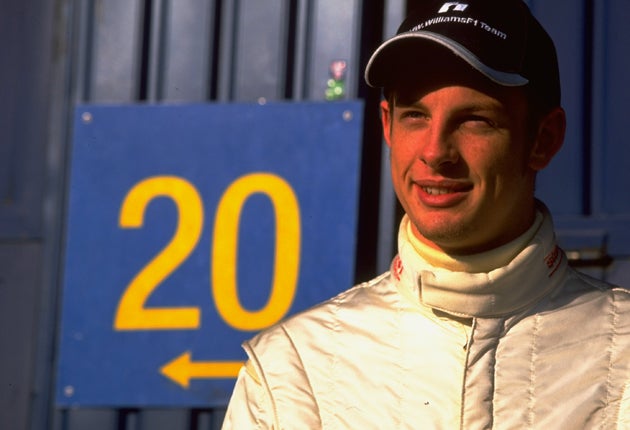Redemption at last for 'playboy' of F1
Briton delivers world title after his undoubted talent looked like going to waste

"Jenson Button," Flavio Briatore said dismissively in 2002, as he prepared to drop him from the Renault team in favour of Fernando Alonso, "is just a playboy."
Button had leapt into the big league straight from Formula Three at the tender age of 20, when Williams partnered him with Ralf Schumacher. He told his super-supportive father John, with disbelief in his voice: "Dad, I'm a Formula One driver!"
His credentials seemed impeccable. He was a past karting champion, had dominated Formula Ford car racing in his first season, and then finished runner-up in Formula Three.
"Jenson shows great potential, and we see in him a champion of the future," Sir Frank Williams said.
Button justified that faith by outqualifying Schumacher Jnr on the really quick circuits – Spa, Monza and Suzuka – and scoring his first world championship point for sixth place in only his second race, in Brazil. But by season's end Williams had an embarrassment of drivers, having previously signed Juan Pablo Montoya for 2001. Button was farmed out to Renault, where his refusal to sign a Briatore driver management contract did not go down well. Nor did it help that he acquired a yacht that he flaunted in Monaco, to go along with the rented house in Weybridge and the Ferrari F430 he had acquired within weeks of joining the Formula One elite.
Button moved to BAR-Honda, where the former champion Jacques Villeneuve reserved a special welcome for him. "Jenson," the French-Canadian said, suggesting that he was more style than substance, "would be better singing in a boy band."
By 2004, however, Button had the last laugh. A series of strong drivers saw him take his first pole position, at Imola, and finish the season third overall behind the dominant Ferraris of Michael Schumacher and his future Brawn partner, Rubens Barrichello. The rehabilitation was complete.
"Maybe I came into it all too young," Button suggested yesterday. "Back in 2001 I thought speed was enough. I didn't understand that to do really well you have to let Formula One become your life."
Under the guidance of David Richards, that lesson had been learnt. But then came a controversy over the BAR's fuel cell in 2005, and Honda buying control of the team for 2006. That year Button scored his first victory, after a feisty drive in poor conditions in Hungary. But Honda was on a slide that would ultimately lead to them running away from the sport at the end of 2008. Button slid with them. The playboy image was long gone, but so was the seriousness with which prospective employers viewed him.
Over a troubled winter he kept the faith with Brawn, taking what amounted to an 80 per cent pay cut, and he dominated six of the first seven races of the 2009 season before a slide into mediocrity threatened to erode the points lead he had so assiduously garnered as he confidence evaporated.
But when it really mattered on Sunday, he fought. It was as if, confronted with the realisation that perhaps his destiny, after all, was to fail at the 11th hour, he finally decided that his only recourse was to relax, to let it flow, to rely on his innate talent and smoothness, which have been compared to the great French champion Alain Prost.
Now the weight had been lifted from his shoulders. Here was a man who had stepped up to the plate and embraced his destiny. There is no doubt that the experiences of 2009 will make him a psychologically stronger driver in 2010. Despite all the wobbles along the way, he knows that he truly deserved his crown.
Born to race Life and times of world champion
1989: Wins British Karting Super Prix, aged nine
1998: Wins British Formula Ford Championship
2000: F1 debut with Williams. Scores 12 points, finishing eighth in standings
2001: Moves to Benetton, but gains only two Championship points
2003: Leads two grands prix for BAR; adds two fourth-place finishes
2004: Maiden pole at Imola and 10 podium finishes help Button to end up third in the season standings.
2006: Moves to Honda after buying himself out of Williams contract. Wins first grand prix in Hungary
2007: A nightmare season at Honda
2008: Button scores only three points
2009: Honda become Brawn-Mercedes after management buyout – Button takes 80 per cent pay cut in the process. Win six of first seven races to take title
Join our commenting forum
Join thought-provoking conversations, follow other Independent readers and see their replies
Comments
Bookmark popover
Removed from bookmarks